Jičín | |
|---|---|
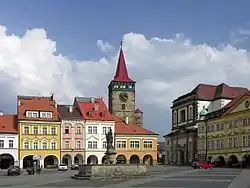 Valdštejnovo Square | |
 Flag  Coat of arms | |
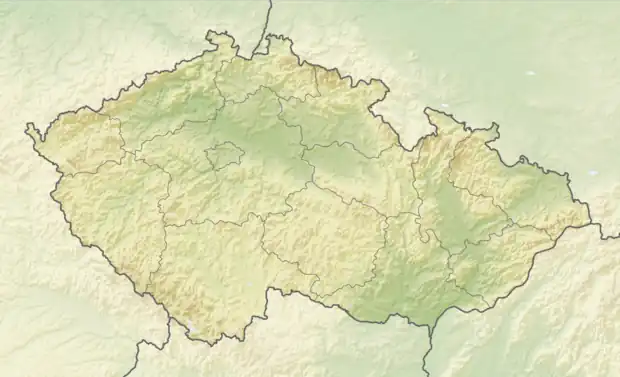 Jičín Location in the Czech Republic | |
| Coordinates: 50°26′12″N 15°21′6″E / 50.43667°N 15.35167°E | |
| Country | |
| Region | Hradec Králové |
| District | Jičín |
| First mentioned | 1293 |
| Government | |
| • Mayor | Jan Malý (ANO) |
| Area | |
| • Total | 25.86 km2 (9.98 sq mi) |
| Elevation | 287 m (942 ft) |
| Population (2023-01-01)[1] | |
| • Total | 16,210 |
| • Density | 630/km2 (1,600/sq mi) |
| Time zone | UTC+1 (CET) |
| • Summer (DST) | UTC+2 (CEST) |
| Postal code | 506 01 |
| Website | www |
Jičín (Czech pronunciation: [ˈjɪtʃiːn]; German: Jitschin or Gitschin) is a town in the Hradec Králové Region of the Czech Republic. It has about 16,000 inhabitants. The historic town centre is well preserved and is protected by law as an urban monument reservation.
The town's history is connected with Albrecht von Wallenstein who had rebuilt the town, and many sights bear his name.
Administrative parts
Jičín is made up of town parts of Holínské Předměstí, Nové Město, Pražské Předměstí, Sedličky, Soudná, Staré Město and Valdické Předměstí, and villages of Dvorce, Hubálov, Moravčice, Popovice and Robousy.
Etymology
The origin of the name Jičín is unknown, but according to the most probable hypotheses, it was derived from the German name of Queen Judith of Habsburg Guta, or from Dičín, derived from the Old Czech word dík (meaning "wild boar", of which many lived here).[2]
Geography
Jičín is located about 85 km (53 mi) northeast of Prague. It lies in the heart of the Jičín Uplands. The highest point is the hill Zebín with an altitude of 399 m (1,309 ft). The town is situated on the Cidlina river. Several other small watercources also flow through the municipal territory, including streams Valdický, Popovický, Úlibický, and Trnávka. There are five ponds in the territory, the largest of them is Šibeňák. Ponds Kníže and Šibeňák are located right in the urban area.
Jičín is sometimes called "Gate to the Bohemian Paradise", however the territory of the Bohemian Paradise region begins beyond the borders of the Jičín municipal territory. In the northern part there are two nature monuments, Zebín (comprising the hill's peak) and Libosad-obora (comprising the whole Libosad park).
History

The area of Jičín is inhabited almost 8,000 years thanks to the convenient geographical and climatic conditions. The settlement in the area of today's town is first mentioned in 1143 in deed of foundation of the Strahov Monastery.[3] The town of Jičín was founded in the 13th century on the place of the village Staré Místo near the Veliš Castle. It was moved northward to its present location shortly afterward, which was better protected by the Cidlina River. The first written mention of Jičín comes from a document by Queen Judith of Habsburg, the wife of King Wenceslaus II of Bohemia, dated 1 August 1293. The town was built with a regular street layout around a rectangular square and was surrounded by wooden fortifications with reinforced bastions and a trench.[2]
Jičín was first the royal town, but in 1337 King John of Bohemia sold it to the Wartenberg family, who owned it until the middle of the 15th century. The Hussite Wars did not affect the town much. During the 15th century, Jičín changed its lords several times until 1487, when it became a property of the House of Trčka of Lípa. With the succession of Vilém Trčka in 1540, the town began to be rebuilt in stone. The fortifications were rebuilt as well, with three gates connecting the centre with peripheries: the western Pražská Gate, the northern Holínská Gate, and the eastern Valdická Gate (1568–1578), which is the only one preserved today. After a large fire in 1572, most of the wooden houses were replaced by stone Renaissance buildings, often decorated with sgrafitti; the parish church was rebuilt as well. In 1587, Burjan Trčka had built a small castle. In 1607, Jičín was acquired by Zikmund Smiřický. The Smiřický family had built here a new larger castle, which replaced the castle of the Trčka family.[2]
The biggest expansion of the town started in 1621 during the Thirty Years' War, when the town became a property of the generalissimo Albrecht von Wallenstein, who made it the centre of his Duchy of Friedland and minted his own coins there. Several architects worked for him, notably Giovanni de Galliano Pieroni, Giovanni Battista Marini, Andrea Spezza, and Nicolo Sebregondi. He had the castle and the Church of St. James rebuilt completely in the North-Italian style and connected them via a roofed footbridge. The town was to be rebuilt completely into a modern town with separated representative and craftsman parts. The parish Church of St. Ignatius together with the college was given to the Jesuits in 1627. Wallenstein also had a summer house with a court of honor, farm buildings, and a game park built in the northern part of the town near Valdice, and a linden alley along the path leading to the summer house. After the early death of Wallenstein in 1634, the town lost much of its importance.[2]
In 1710 the town became a property of the House of Trauttmansdorff, which meant the arrival of the period of High Baroque, during which many constructions were completed. Many statues and sculptures in the town today come from this period. In 1784 Jičín became the seat of a new region. During the first half of the 19th century the town spread quickly, especially eastward.
The Battle of Gitschin was fought nearby during the Austro-Prussian War of 1866.
Until 1918, the town was part of the Austrian monarchy (Austria side after the compromise of 1867), head of the Jicin – Jičín District, one of the 94 Bezirkshauptmannschaften in Bohemia.[4]
In 2019, the village of Hubálov, originally part of Tuř, was joined to Jičín. The transfer of the entire cadastral territory is unique in the modern history of the country.[5]
Demographics
|
|
| ||||||||||||||||||||||||||||||||||||||||||||||||||||||
| Source: Censuses[6][7][lower-alpha 1] | ||||||||||||||||||||||||||||||||||||||||||||||||||||||||
Culture
Jičín is connected with the popular fairy tale character, Robin Hood-like robber Rumcajs. The town hosts the annual festival called "Jičín – The Town of Fairy Tale" established in 1990.[8]
Sights

The historic centre is built around a rectangular square with a regular Gothic street layout, remnants of fortifications and arcade Renaissance and Baroque houses.
The historic core is formed by Valdštejnské Square, where is the Valdštejnský Castle. The castle houses the Regional Museum and Gallery, a library and a primary art school, among others. There is also a castle park. Next to the castle is the Church of Saint James the Great. The church, intended as a seat of a never-established bishopric, has never been completed, so it lacks a spire and a cupola.[9]
North of the town is the Baroque summer house of Albrecht von Wallenstein called Valdštejnská Loggia. The original game park around it is nowadays a park called Libosad. The loggia is connected with the town by a 1.7 kilometres (1.1 mi)-long alley of linden trees.[2] The loggia, the park and the alley together with the town centre are parts of so-called Wallenstein's Baroque composed landscape (designed landscape axes connecting sacral buildings, landscape landmarks and the town) which was unfinished due to early death of von Wallenstein.[9]
There are several Jewish sights in the town. The most notable is the former synagogue, which was first documented in 1773.[9]
Notable people
- Jacob Bassevi (1580–1634), Jewish court financier
- Albrecht von Wallenstein (1583–1634), generalissimo and town lord
- Josef Gočár (1880–1945), architect
- František Kaván (1866–1941), painter and poet
- Karl Kraus (1874–1936), writer
- Vlastislav Hofman (1884–1964), artist and architect
- Josef Váchal (1884–1969), writer and painter
- Jaroslav Řezáč (1886–1974), ice hockey player
- Michal Suchánek (born 1965), actor and comedian
- Miluše Bittnerová (born 1977), actress
- Jana Plodková (born 1981), actress
- Jaroslav Soukup (born 1982), biathlete
Twin towns – sister cities
 Erbach im Odenwald, Germany
Erbach im Odenwald, Germany Martin, Slovakia
Martin, Slovakia Świdnica County, Poland
Świdnica County, Poland
Gallery
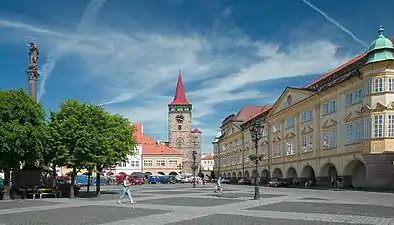 Valdštejnovo Square with the Valdická Gate and the castle
Valdštejnovo Square with the Valdická Gate and the castle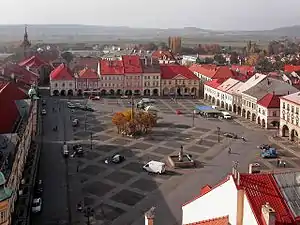 View of the Valdštejnovo Square from the Valdická Gate
View of the Valdštejnovo Square from the Valdická Gate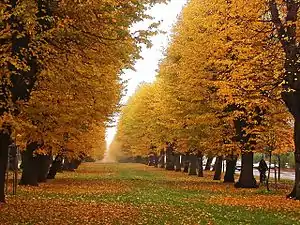 Linden alley connecting the Libosad park with the centre
Linden alley connecting the Libosad park with the centre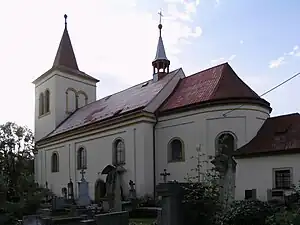 Church of the Finding of the Holy Cross in Robousy
Church of the Finding of the Holy Cross in Robousy
Notes
References
- ↑ "Population of Municipalities – 1 January 2023". Czech Statistical Office. 2023-05-23.
- 1 2 3 4 5 "Historie města Jičína a jeho nejbližšího okolí" (in Czech). Interregion. Retrieved 2021-09-15.
- ↑ "Historie města" (in Czech). Město Jičín. Retrieved 2021-09-15.
- ↑ Die postalischen Abstempelungen auf den österreichischen Postwertzeichen-Ausgaben 1867, 1883 und 1890, Wilhelm Klein, 1967
- ↑ Tobolková, Radka (2019-09-26). "Smlouva je podepsána. Hubálov patří Jičínu". Jičínský Deník (in Czech). Deník.cz. Retrieved 2022-11-10.
- ↑ "Historický lexikon obcí České republiky 1869–2011 – Okres Jičín" (in Czech). Czech Statistical Office. 2015-12-21. pp. 5–6, 17–18.
- ↑ "Population Census 2021: Population by sex". Public Database. Czech Statistical Office. 2021-03-27.
- ↑ "Jičín – město pohádky" (in Czech). Město Jičín. Retrieved 2021-09-15.
- 1 2 3 "První písemná zmínka o městě Jičín je stará 725 let" (in Czech). Hradecká drbna. 2018-08-04. Retrieved 2021-09-15.
- ↑ "Partnerská města" (in Czech). Město Jičín. Retrieved 2021-09-15.